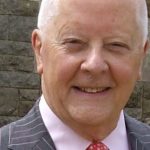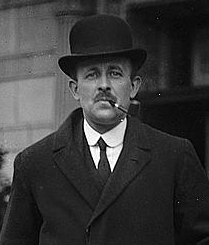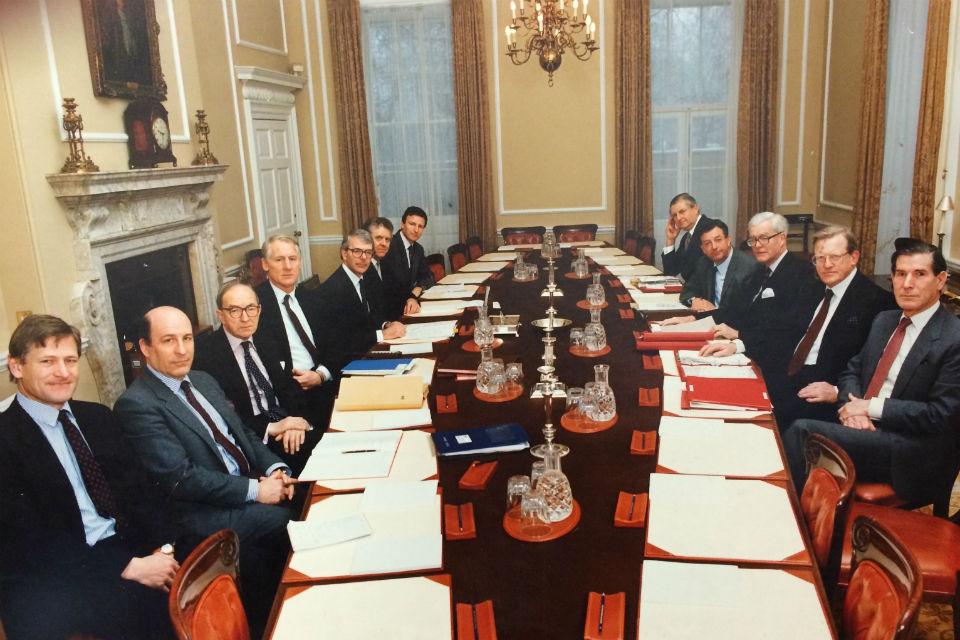
On 9 December 1916, Maurice Hankey took the first set of modern minutes at the War Cabinet. It was a move to bring greater clarity to the recording of government decisions and to improve their implementation. In the 100 years since then he has had just ten successors as Cabinet Secretary. The Cabinet Office itself has developed from a secretariat into a department in its own right, shaped and changed by the evolving role of the Cabinet Secretary.

How did the Cabinet Office become the powerhouse it is today? Organising Cabinet meetings and taking the record of the discussions – how boring is that? Well, it's not quite that simple.
There is no job description in the conventional sense. The task changes in response to how the Prime Minister of the day wishes to run things.
For a start, events intrude. Often the Prime Minister needs wriggle room and the Cabinet Secretary can provide it. Two years after replacing Anthony Eden following the Suez debacle in 1956, Harold Macmillan asked Norman Brook to lead a study on the future world role of the UK. Despite involving Whitehall’s best brains, in the eyes of ministers the report was too pessimistic for discussion at Cabinet. It joined the mountain of reports with fine analysis and unimplemented recommendations. Yet Macmillan lost no face.
Or take 1973, when the price of oil quadrupled, threatening the economic stability of the West. Prime Minister Edward Heath dispatched John Hunt as his personal representative to “smoke out American intentions”. As summit meetings became more frequent, so the role of the personal representative grew.
Consider 1976, when Jim Callaghan sent Hunt on a secret mission to Germany. His task was to seek support for sterling. Britain was in another economic crisis. It sought a massive loan from the International Monetary Fund. This required a severe austerity package. At the key Cabinet discussion Hunt slipped a note to the Prime Minister: “The Cabinet don’t really know how hard you and the Chancellor have been fighting.” He continued with real-time advice on how to handle the crucial but difficult discussion and was pivotal in securing agreement.
In 1982 the then Cabinet Secretary, Robert Armstrong, established the Mandarin Group that met daily to prepare the ground for ministers’ politico-military decisions on the conduct of the Falklands campaign.
In 1983 Robert Armstrong and David Goodall began discussions with Dermot Nally and other officials of the Irish Government on the future of Northern Ireland. Margaret Thatcher allowed the work to continue because she knew that she could put an end to it at any time. Their work led to the Anglo-Irish Agreement of 1985, an important step in the peace process.

More recently, Richard Wilson’s decisive actions to close London City Airport and establish an immediate no-fly zone over London after the 2001 attack on the Twin Towers in New York, freed Tony Blair to focus on the strategic issues.
And the expectations of the public have also changed. When television news channels started, the pressure on a prime minister to respond to a vast array of issues meant that the Cabinet Office had to give more of a lead to other departments. What had started as an issue of scheduling and recording became one of getting ahead of the curve. Which is close to where we came in – the more things change, the more they stay the same.
I am often asked who was the greatest Cabinet Secretary. I usually say – tongue in cheek – the 12th, the fictitious Sir Humphrey Appleby of ‘Yes, Prime Minister’: never bettered in argument, always there with a clever ruse. He is to the Civil Service what James Bond is to MI6.
Ian Beesley has written the independently published official history of Cabinet Secretaries in the post-war period up to 2002.

10 comments
Comment by Rob B posted on
Well, I have no preference but check out the link below. See how Lord Butler (Cabinet Secretary 1988 to 1998, fourth left in photo above) maintains Civil Service impartiality throughout the interview.
http://www.cabinetsecretaries.com/_lib/pdf/Former%20Cabinet%20Secretary%20Lord%20Butler%20Interview%20with%20Anthony%20Seldon.pdf
And below is the home page to a series of interviews (video and transcript) with the Cabinet Secretaries from 1979 to present.
http://www.cabinetsecretaries.com/
Comment by P A Skinner posted on
11 'managers' in 100 years - many football teams would be envious of that!
Comment by Julie Pierce posted on
And how has the gradual arrival of women into the Cabinet Office and Cabinet changed things do you think?
Comment by Chris Lamb posted on
'There is no job description in the conventional sense. The task changes in response to how the Prime Minister of the day wishes to run things'.
Given the closeness of the relationship between the Prime Minister and Cabinet Secretary and the absence of a written 'job description' for the Cabinet Secretary, which specifies the constitutional boundaries- setting a firewall- between exercising a purely advisory role and straying into and contributing to policy making, can it be asserted with absolute confidence that the Cabinet Secretary is not, on occasions, a political animal in the set up of party government?
I am not convinced that the argument that the Cabinet Secretary serves governments of different party complexions resolves this problem of exercising a political role . For example, when Edward Heath sent John Hunt as his 'personal representative' to 'smoke out American intentions' was this not in a sense to perform a political role or when James Callaghan sent Hunt on a 'secret mission' to Germany to test the ground for a severe austerity package in the UK in order to support sterling?
Most recently, the Chilcot Report criticized Richard Wilson for failing to make sufficient records of top level meetings called by Prime Minister Blair in the lead up to the 2003 Iraq invasion. This contributed to the problem of 'sofa government', a decision making process which achieved the Prime Minister's political ambition but at the expense of not leaving an audit trail for accountability purposes..
Comment by David Beeney posted on
An interesting read. One question though. Callaghan didn't become PM until 1976. Did the events described above in relation to the economic crisis in 1975 take place when Callaghan was Foreign Secretary in Prime Minister WIlson's cabinet?
Comment by A. Christy posted on
You'll never top Sir Humphrey Appleby. (Well SOMEBODY had to mention him!)
Comment by John Armstrong posted on
I agree it's difficult to top the fictional Appleby, but Robert Armstrong (no relation, AFAIK!) who was operating around the same time must run him close with his "economical with the truth" remark.
Comment by SB posted on
Maurice Hankey, the first Cabinet Secretary, is so far the only one to not attend either Oxford or Cambridge University.
I wonder how long will it be before there is a second non-Oxbridge graduate as Cabinet Secretary?
Comment by Phil Moxon posted on
A fascinating subject area and in the current political climate it is one that we should hold in high regard. Whilst politics divides, the Civil Service and those close to Ministers have a greater responsibility than ever to steer the good ship on a course that is straight and narrow. It is unlikely I will fulfil my ambition to 'be' Sir Humphrey, but now and then something comes along that shapes your life and stays with you forever. For me, it is conversations between Jim and Sir Humphrey such as discussing who has sovereignty in the event of a Channel Tunnel 'incident'. What a shame we are looking to sever ties 'linked' by what was then just a pipe dream and appeared to be something light years away. I wonder what Sir Humphrey would make of it all...
Comment by Charlotte Smith posted on
Actually back in 1895 when the gas lamps were still in use and hansom cabs were the main form of transport in the cities, the first ever Home Office secretary was in fact Mycroft Holmes! Anyone who has read Sir Arthur Conan Doyle's Sherlock Holmes stories will know that Mycroft Holmes WAS the Government behind closed door behind the guise of the Diogenes Club!!
All joking apart an interesting article, but i would have liked to seen more of the early days of the Home Office stemming back to the latter Victorian era and through to the 1900s. A simpler less fraught age than the world we live in today.